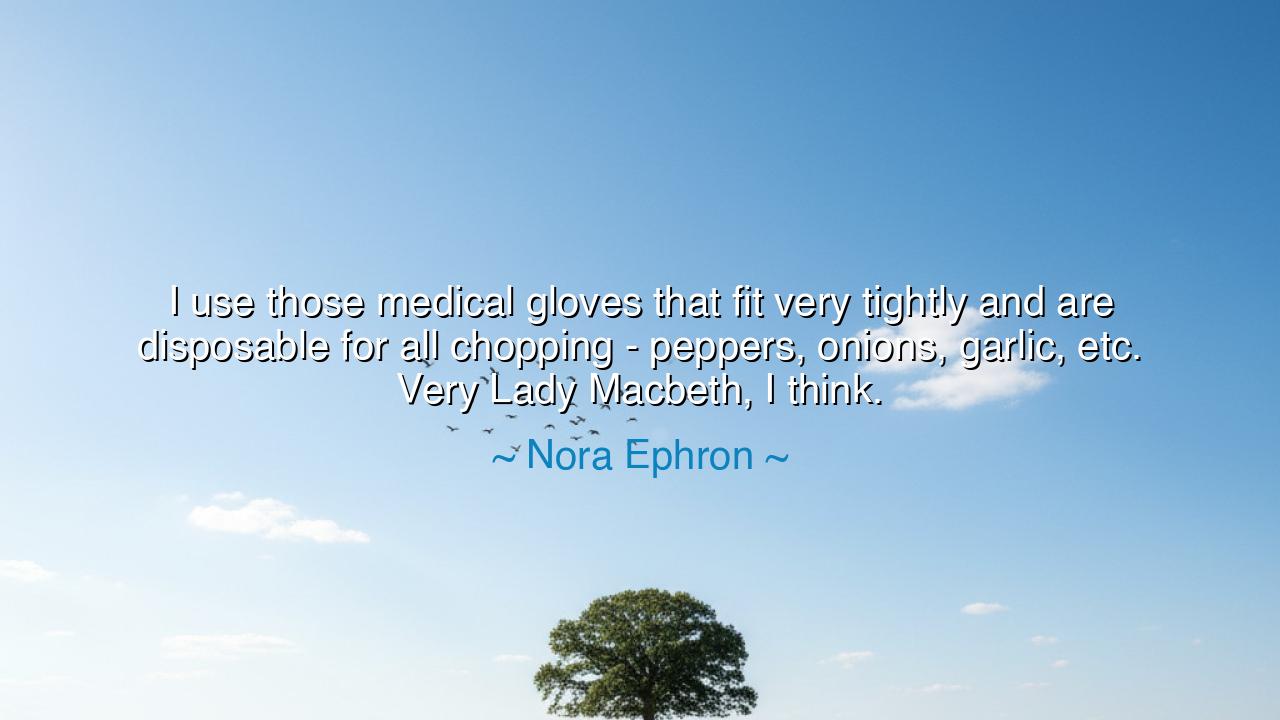
I use those medical gloves that fit very tightly and are
I use those medical gloves that fit very tightly and are disposable for all chopping - peppers, onions, garlic, etc. Very Lady Macbeth, I think.






Hear, O lovers of wit and wisdom, the words of Nora Ephron, who declared with her trademark sharpness: “I use those medical gloves that fit very tightly and are disposable for all chopping—peppers, onions, garlic, etc. Very Lady Macbeth, I think.” At first, these words seem light, almost playful, a comment on the kitchen. Yet within them lies a double truth: one of practicality in daily life, and another of theatrical imagination, where the simplest acts may carry echoes of literature, drama, and human passion.
The origin of this saying rests in Ephron’s own life as a writer, humorist, and keen observer of the ordinary. She often transformed the mundane—cooking, relationships, aging—into sources of reflection and laughter. In this moment, she describes her choice to wear gloves while cooking, protecting her hands from the sting of onions and the lingering fire of peppers. But she does not stop there; she frames this act with the dramatic image of Lady Macbeth, scrubbing her hands in Shakespeare’s tragedy, haunted by invisible stains of guilt. In Ephron’s imagination, the kitchen becomes a stage, the cook an actress, and chopping vegetables an act filled with comic drama.
To call the gloves “very Lady Macbeth” is to reveal Ephron’s genius at linking the everyday with the eternal. In Shakespeare’s play, Lady Macbeth cries, “Out, damned spot!” as she attempts to wash away the bloodstains of her crimes. In Ephron’s kitchen, the glove-wearing cook is spared the stains of garlic or peppers, but in her playful comparison we are reminded of how humans dramatize their struggles, however small. She shows us that imagination is what transforms irritation into laughter, and what makes ordinary life richer than it first appears.
History abounds with similar lessons, where the mundane is lifted into meaning. Think of Montaigne, who wrote essays on the smallest details of his daily life—sleep, eating, even the way he rubbed his cat—and through them revealed profound truths about humanity. Or recall the Stoic philosophers, who advised that even simple acts like drinking water or breaking bread should be done with mindfulness, for in them lies a reflection of the human condition. Ephron, in her humor, follows this tradition, teaching us that chopping vegetables is not beneath the attention of art, but fertile ground for wisdom and joy.
The deeper meaning of her words is that we must not overlook the significance of ordinary rituals. A kitchen, filled with onions and peppers, may seem far removed from the grandeur of tragedy, but it is in such places that we live most of our lives. By invoking Lady Macbeth, Ephron reminds us that the human imagination can transform any act, however small, into something vibrant, meaningful, even dramatic. In this way, we are never condemned to dullness; with a playful mind, every moment is an opportunity to find laughter and reflection.
And yet there is also practical wisdom here. The medical glove is protection, a barrier that prevents irritation and stain. Ephron, through humor, shows us the value of small acts of care for oneself. Life is not only about endurance but also about making the journey more pleasant, even in small tasks like cooking. To laugh, to protect oneself, and to carry imagination into daily chores—these are not trivialities, but ways of keeping the soul alive in the midst of routine.
The lesson, O listeners, is this: approach your daily tasks not as burdens but as stages for creativity. Guard yourself wisely, as with gloves, but let your imagination wander freely, as Ephron’s did, turning chopping garlic into Shakespearean theatre. In this way, life becomes not a grind but a play—one in which you are both actor and audience, both cook and poet.
Thus let Ephron’s words endure: “Very Lady Macbeth, I think.” They teach us that humor is a kind of wisdom, that imagination is a form of resilience, and that no act of life is too small to be infused with art, laughter, and respect for the ordinary.






AAdministratorAdministrator
Welcome, honored guests. Please leave a comment, we will respond soon